Workshops
Please ensure you have enrolled in the workshop course in enrolment online before proceeding with preferencing.
(Note: There is a separate page for Fine Art Studio classes and a separate page for ART: History+Theory+Cultures classes.)
The workshops will be for both first and second year students and will be offered under the following course codes:
Workshop 2 VART 3650 (1st year students)
Workshop 4 VART 3652 (2nd year students)
These Workshop classes are 12 credit point courses and will require 3 contact hours per week plus associated learner directed hours.
For more information about a course, please contact the Studio Lead of the offering studio or course coordinator.
Please check your student email for details about how to preference for Semester 2.
Preferencing opened on Friday 19th June and closes on Friday 26th June at 5pm (sharp).
You must not repeat any class in your preference lists. Every effort will be made to place you in your first preference classes.
IMPORTANT PLEASE NOTE: Although we would like to offer all of the workshop options below, classes are subject to viability and may not run if numbers are too low. Fine Art Workshop classes are in planning for campus access in Semester 2 2020. These plans are still subject to approval and confirmation to ensure they align to RMIT’s COVIDSafe Guidelines for the safety of our student and staff community. We are anticipating being able to confirm the plans and to provide more specific details at the end of June.
Course Information
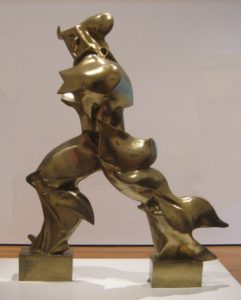
Unique Forms of Continuity in Space, 1913 bronze by Umberto Boccioni
Bronze Foundry - CANCELLED
In this course you will develop practical skills across a range of processes and materials which are commonly used in sculpture practice. You will be introduced to particular methods and materials through specific projects, with an emphasis on the relation to individual concepts in art making. Some of these include; lost wax casting (bronze and aluminium), fabrication in metal and timber, pattern making. You will be given practical instruction and experience in the use of workshop equipment together with relevant health and safety training. The course is mainly practical but with appropriate tutorial presentations covering theoretical and relevant historical background.
Face to face contact hours:
This course is planning to run as a blended learning delivery mode of both online and face to face access. Face to face contact time would be organised as a rotational timetable system to adhere to social distancing and safe working practices. Details on class scheduling for on-campus activities would be provided in Canvas.
*If your situation prevents you from returning to campus in semester 2, you may continue to remain learning online though some courses are better suited than others. Please contact the course coordinator if this is your preference to seek advice.
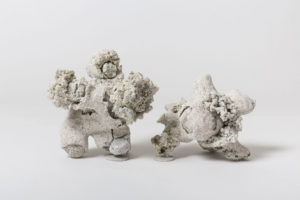
Narelle White, 2018, Ceramic, Photographer: Janelle Low
Clay as Vibrant Matter
Clay is an irresistible material with endless making potential. This subject is a playful and explorative approach to clay in its many forms: liquid, plastic, hard and fired. Students will be guided through a series of projects asking the material: What if? This subject has the potential of creating alternative or un-imagined outcomes.
Face to face contact hours:
This course is planning to run as a blended learning delivery mode of both online and face to face access. Face to face contact time would be organised as a rotational timetable system to adhere to social distancing and safe working practices. Details on class scheduling for on-campus activities would be provided in Canvas.
*If your situation prevents you from returning to campus in semester 2, you may continue to remain learning online though some courses are better suited than others. Please contact the course coordinator if this is your preference to seek advice.
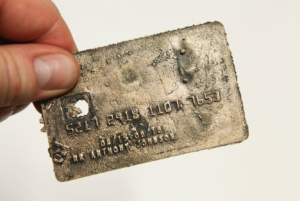
Fossil (08/15-08/18)
Anthony Johnson – Credit card sent to a foundry to finance its transformation into bronze. 2015 Bronze
Concepts of Representation
Concepts of Representation will examine a range of ideas and practices relating to modes of representation and ways of seeing. Linking theory to practice, this course will develop your formal and conceptual understanding of varying uses and abuses of representation.You will explore the knowledge and application of these fundamental ideas as they emerge through a range of deep research into alternative creative practices including: drawing, planning, mapping, design, text, reprographics and performative relational gestures.
You will be encouraged to reflect on this primary point of investigation via a selection of modernist to contemporary art practices.
The objectives of this course are to understand how knowledge and making are linked through different ways of seeing and thinking through making. You will make creative works and relate critical concepts, texts and practices to your studio production.
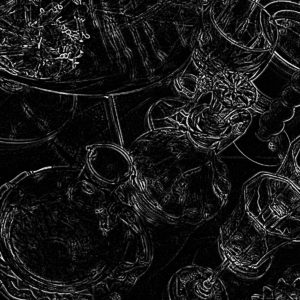
Irene Barberis, charcoal on paper (detail)
Drawing and Perception
This course offers you a structured program in drawing techniques, refinement of general drawing skills and approaches to seeing and perception. It encompasses life drawing and general drawing including aspects of the figure, perspective, pictorial composition and the investigation of self and personal vision. You will produce a folio of resolved drawings with a support folio of studies and research material that are relevant to a range of areas of study. You will examine formal conventions of drawing, historical contexts and its capacity to communicate expressively across a range of media.
Face to face contact hours:
This course is planning to run as a blended learning delivery mode of both online and face to face access. Face to face contact time would be organised as a rotational timetable system to adhere to social distancing and safe working practices. Details on class scheduling for on-campus activities would be provided in Canvas.
*If your situation prevents you from returning to campus in semester 2, you may continue to remain learning online though some courses are better suited than others. Please contact the course coordinator if this is your preference to seek advice.
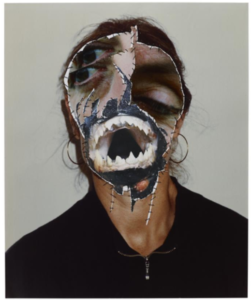
Annegret Soltau Grima 1986 - 1997
Hybrid Material Practice
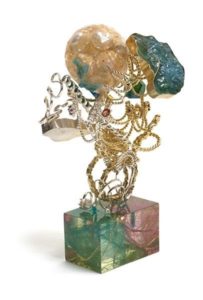
Nina Oikawa, Fossil Ocean, 2010, Ring on Stand, Sterling silver, resin, freshwater pearls, akoya pearl, sapphire, citrine, amethyst, calcite, leaves
Jewellery Attachments
In this course, you will use your current jewellery skills to explore how the notion of attachment can be applied to jewellery making to incorporate non-metallic materials. You will examine how the gemstone, both semi-precious and artificial, can be invigorated and repositioned in a contemporary art jewellery context. You will first investigate methods of stone setting and you will then extend this knowledge by experimenting with different ways of attaching non-metal to metal.
You will develop your own personal approaches to the inclusion of other materials in jewellery objects and you will look at how the found object can extend the meaning of the work. You will rethink historical and cultural perceptions of jewellery value through the making of new jewellery works.
This course is suited to students from Gold & Silversmithing and those who have taken the elective Jewellery Fundamentals. You will need jewellery tools, PPE and materials including silver in this course, please email the Gold & Silversmithing Studio Leader for more details.
Face to face contact hours:
This course is planning to run as a blended learning delivery mode of both online and face to face access. Face to face contact time would be organised as a rotational timetable system to adhere to social distancing and safe working practices. Details on class scheduling for on-campus activities would be provided in Canvas.
*If your situation prevents you from returning to campus in semester 2, you may continue to remain learning online though some courses are better suited than others. Please contact the course coordinator if this is your preference to seek advice.
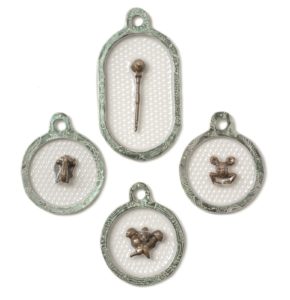
Courtney Hogan, Pendants, 2019, sterling silver, copper, enamel
Jewellery Multiples & Editions - CANCELLED
In this course students will explore fabrication and multiplication techniques for the jewellery object. The technical and physical properties of various analogue processes, such as small scale casting, will be used to create small editions of work. Students will consider the series as a method to express the multiplicity of a singular concept in building contemporary three-dimensional jewellery and objects. This course will advance jewellery skills to develop conceptual, perceptual, formal and aesthetic concerns as related to the multiple and the edition in jewellery.
You will need PPE and materials, including purchasing silver for casting, in this course.
Face to face contact hours:
This course is planning to run as a blended learning delivery mode of both online and face to face access. Face to face contact time would be organised as a rotational timetable system to adhere to social distancing and safe working practices. Details on class scheduling for on-campus activities would be provided in Canvas.
*If your situation prevents you from returning to campus in semester 2, you may continue to remain learning online though some courses are better suited than others. Please contact the course coordinator if this is your preference to seek advice.
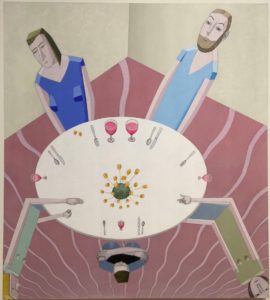
Mernet Larsen, Punch, 2016. Synthetic polymer paint and mixed media on canvas. Patricia Lucille Bernard Bequest Fund, 2016, Art Gallery of New South Wales. Photo, Peter Ellis
Painting, Concepts and Practice
This workshop extends upon the concepts, materials and process of painting and related practices of drawing, installation and the object. You will experience a wide range of materials and production processes to create artworks relating to painting with an emphasis on experimentation, conceptual development and studio research.
The course is structured through generalised thematic projects and advanced individual self-directed projects. You will experiment with materiality, colour, surface, scale, texture, gesture, images, chance, pattern, repetition and working in series. There will be a focus on abstraction and figurative modes of expression. Themes in contemporary art will be investigated to demonstrate how artists initiate, expand and maximize outputs through experimentation and research.
Individual and group tutorials, discussion and feedback sessions, studio demonstrations and studio health and safety complement this painting workshop.
This semester Painting Workshop aims to expand on strategies to develop and extend ideas, techniques and skills, and encourage a more individual approach to a painting practice utilising sustainable working methods.
You will engage in practical studio projects, designed for you to experience the expanded field of painting, which includes a rich variety of media, including oil paint and aqueous media, such as watercolour, gouache, acrylic and synthetic polymer emulsions, leading towards an individual studio practice. You will keep a visual journal and a digital folio that captures your ideas and influences. You will experience individual and group tutorials, demonstrations, Health and Safety in the studio and visual lectures in a supportive environment.
Face to face contact hours:
This course is planning to run as a blended learning delivery mode of both online and face to face access. Face to face contact time would be organised as a rotational timetable system to adhere to social distancing and safe working practices. Details on class scheduling for on-campus activities would be provided in Canvas.
*If your situation prevents you from returning to campus in semester 2, you may continue to remain learning online though some courses are better suited than others. Please contact the course coordinator if this is your preference to seek advice.
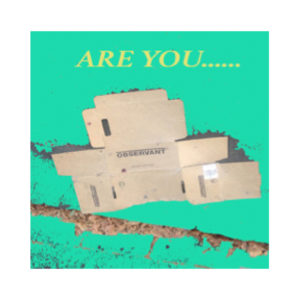
Phil Edwards, Collage
Painting the Everyday
In this workshop, you will experience how artists use, re assemble and respond to found materials and concepts from the experience of everyday life.
This workshop course aims to explore how the observation of everyday objects, in particular miniscule (very small) objects, can be used as a starting point for the making of art. You will be asked to collect, photograph and assemble objects chosen from domestic environments, $2.00 shops, discarded materials and elsewhere
in order to develop an expanded painting practice using a variety of media, techniques and conceptual concerns. It is envisaged that from the humble beginnings and roles of the everyday objects chosen, a significant series of works on paper and other supports, will be developed using combinations of painterly representation, abstraction, and collage. Media used will include photographs, charcoal, pencil, ink, crayon, watercolour, acrylic paint, oil paint and digital media.
It is envisaged that a change in direction of making will occur each week.
You will develop a personal project in consultation with the lecturer.
This workshop aims to extend your skills in making art through innovation, experimentation and visual play. The workshop is complemented by visual lectures, supportive tutorials and feedback and a group collaborative exhibition.
Face to face contact hours:
This course is planning to run as a blended learning delivery mode of both online and face to face access. Face to face contact time would be organised as a rotational timetable system to adhere to social distancing and safe working practices. Details on class scheduling for on-campus activities would be provided in Canvas.
*If your situation prevents you from returning to campus in semester 2, you may continue to remain learning online though some courses are better suited than others. Please contact the course coordinator if this is your preference to seek advice.
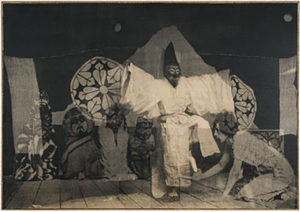
David Noonan, Two Moons, 2009-10
Photographic Screen Printing
This course will introduce you to screen printing processes and technologies that focus on photographic and text based printing. The objectives of the course are to provide you with the skills and knowledge to: produce photographic screen prints; reflect upon the role of photographic screen printing in contemporary art while expanding the aesthetic and conceptual possibilities of your art practice.
Face to face contact hours:
This course is planning to run as a blended learning delivery mode of both online and face to face access. Face to face contact time would be organised as a rotational timetable system to adhere to social distancing and safe working practices. Details on class scheduling for on-campus activities would be provided in Canvas.
*If your situation prevents you from returning to campus in semester 2, you may continue to remain learning online though some courses are better suited than others. Please contact the course coordinator if this is your preference to seek advice.
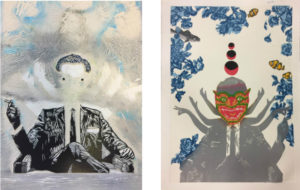
Bow Vacharussiriyuth, reduction linocut in progress, 2016
Print (Re)Generations
In this hands-on course you will explore ways in which contemporary print processes can inform traditional print production and vice versa. Sourced materials/imagery, photographs, historical references and hand drawings will be mediated through Photoshop or collage. You will generate conceptually and visually coherent working drawings, collages and proofs which will, in turn, inform the production of original prints that utilise the reduction linocut processes. Skills that you will acquire through the reduction linocut process will include registration, carving and printing a lino block, colour mixing, editioning and generating unique states. Notions of appropriation, quotation, recycling and hybridity will be embedded into explorations of the unique possibilities offered by various print generations. You will also investigate the ongoing dialogues between historical and contemporary methods of print production.
Face to face contact hours:
This course is planning to run as a blended learning delivery mode of both online and face to face access. Face to face contact time would be organised as a rotational timetable system to adhere to social distancing and safe working practices. Details on class scheduling for on-campus activities would be provided in Canvas.
*If your situation prevents you from returning to campus in semester 2, you may continue to remain learning online though some courses are better suited than others. Please contact the course coordinator if this is your preference to seek advice.
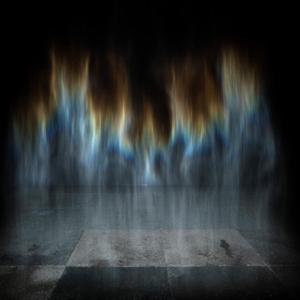
Image Credit: Olafur Eliasson, Beauty, 1993 San Francisco Museum of Modern Art, 2007 Photo: Ian Reeves / Courtesy of San Francisco Museum of Modern Art
Projection Light & Optics
In this course you will explore the possibilities of light, lighting, lenses and projection, experimenting with old and new projection technologies such as the Camera obscura, Camera Lucida, overhead projection and contemporary digital projection and lighting kits both as an experimental tool for making art and a mode of display.
Face to face contact hours:
This course is planning to run as a blended learning delivery mode of both online and face to face access. Face to face contact time would be organised as a rotational timetable system to adhere to social distancing and safe working practices. Details on class scheduling for on-campus activities would be provided in Canvas.
*If your situation prevents you from returning to campus in semester 2, you may continue to remain learning online though some courses are better suited than others. Please contact the course coordinator if this is your preference to seek advice.
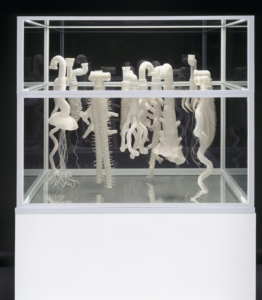
FIONA HALL "DEAD IN THE WATER" 1999 NATIONAL GALLERY OF VICTORIA, MELBOURNE. PURCHASED, 1999 © COURTESY OF THE ARTIST
Soft Sculpture - CANCELLED
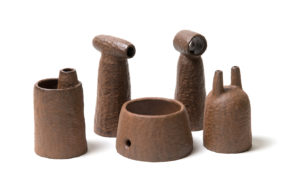
Lucy Mactier, 2016, porcelain
The Functional Object
The functional object: An investigation into the function of objects and what defines the purpose and how this can take material form. Thinking about ritual, domestic and symbolic concepts, as well as the relationship of tactility, utility and aesthetic, primarily through ceramic making techniques.
Face to face contact hours:
This course is planning to run as a blended learning delivery mode of both online and face to face access. Face to face contact time would be organised as a rotational timetable system to adhere to social distancing and safe working practices. Details on class scheduling for on-campus activities would be provided in Canvas.
*If your situation prevents you from returning to campus in semester 2, you may continue to remain learning online though some courses are better suited than others. Please contact the course coordinator if this is your preference to seek advice.